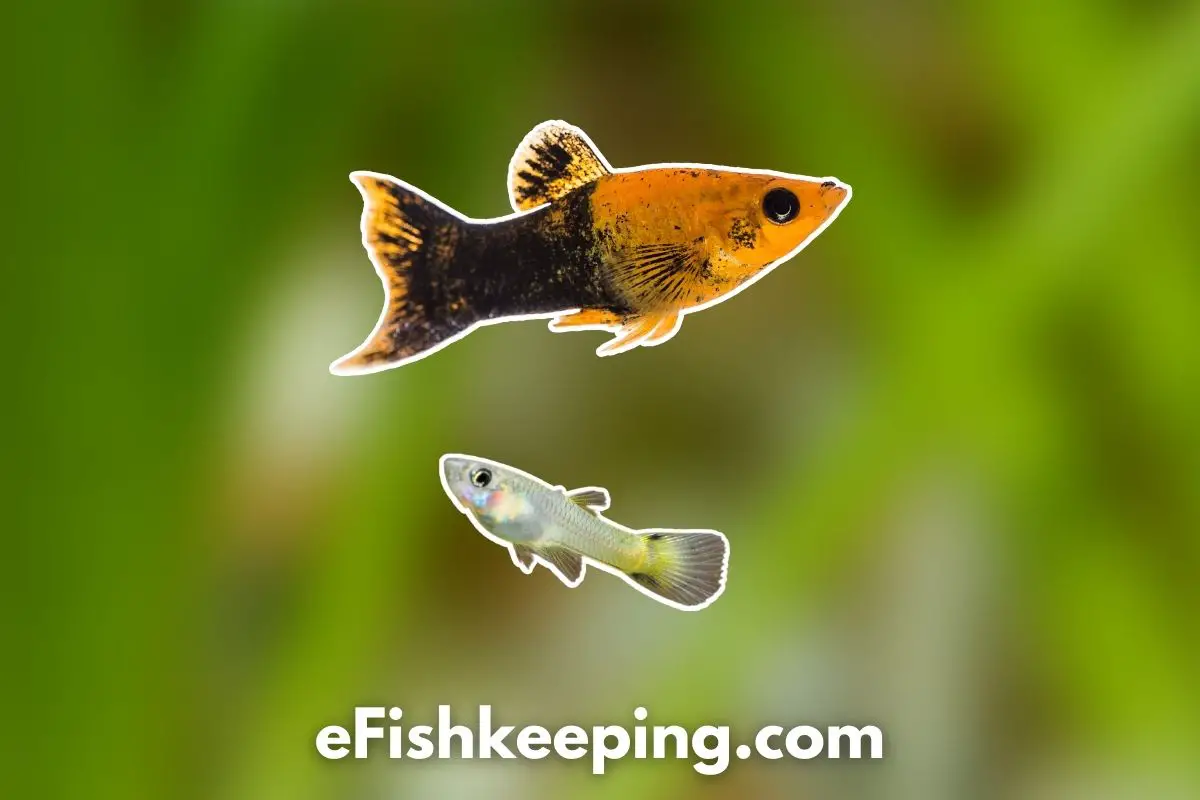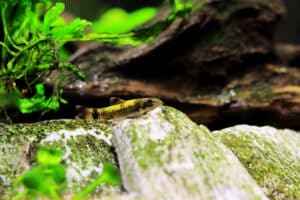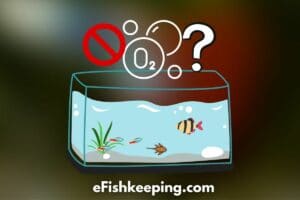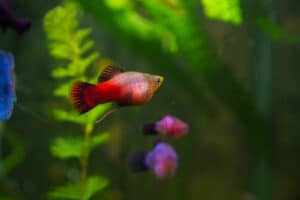Do you have mollies with guppies in your tank already? Or maybe you are just thinking of keeping them together. So, will mollies eat guppy fry?
As a general rule, mollies will eat guppy fry because mollies are opportunistic feeders, and they can consume anything that fits in their mouths. However, sometimes you can be lucky if the guppy fry is active enough to flee away.
Read on to learn what makes Molly a vulnerable tank mate for the guppy fry, the feeding behavior of molly fish, and some cool prevention tips to avoid the problem in case you don’t have any other choice!
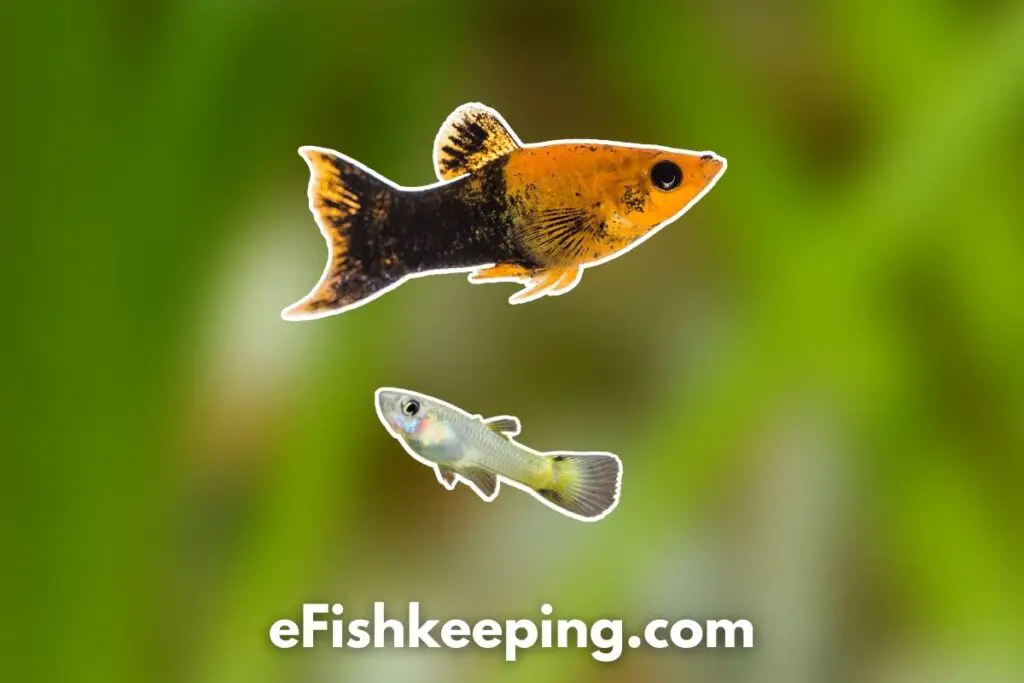
Why Can Mollies Eat Guppy Fry?
Here are some of the reasons that increase the possibility of Molly eating a guppy fry:
- Mollies are opportunistic feeders, which means they will be happy to eat anything available to them.
- They tend to eat whatever fits inside their mouth.
- Did you know that mollies can eat their babies? (So just think, if Molly’s own baby is not safe, how can the guppy fry be safe from Molly!)
- Mollies are omnivores, and they get their protein from things like insect larvae, insects, small crustaceans, and small fish.
Feeding Behavior Of Mollies
In the wild, mollies consume things like small invertebrates, plant matter, and algae.
When we keep mollies in home aquariums, we are needed to feed them high-quality flake foods and different vegetables.
The favorite vegetables of mollies are:
- blanched zucchini medallions
- cucumber medallions
- shelled peas
If you find it hard to cut and blanch the vegetables, you can also complete the place of plant matter in their diet by using a spirulina-based pellet or flake.
Read Also: Do Mollies Eat Hydra?
How Can You Prevent Molly From Eating Guppy Fry?
Ideally, it is better to avoid keeping mollies with guppy fry. However, what to do if you have no other choice? Then for such a condition, here are some preventive tips you can try out:
#1. Try To Add Plants To Create Hiding Places For The Guppy Fry
Let’s suppose your mollies are chasing your guppy fry. Then what is one of the best things to offer hiding places for the guppy fry to protect themselves? Plants in the aquarium!
Here are some plants that you can add to your guppy tank:
Anacharis Elodea Densa
This plant is also known as Brazilian Taer Weed, and it is the perfect choice for you if you are looking for a background plant for your guppy tank.
This plant can grow up to 8 inches in length and has dark green stems along with many leaves. The leaves will not allow the guppies to lay eggs but also for the fry to grow and hide.
The only thing to remember is that this plant won’t stop growing, so you have to trim it regularly. You can also add some liquid fertilizer for this plant.
The benefit of this plant is that you can grow it in most water conditions, and it looks good as a background plant.
Flame Moss
Flame Moss is another great plant that can offer hiding places to guppy fry. This plant grows at a medium rate, and it can reach a maximum height of up to 4″.
This plant grows upwards in the shape of a flame, and it is easy to care for. In addition, it offers good coverage for the fry.
Water Wisteria
Water Wisteria is a hardy plant, and you can use it as a carpet or a background plant based on your preference. This plant helps keep the water clean and also offers many hiding spots for the fry.
This plant is easy to care for; however, it needs decent lighting.
#2. Feed Your Mollies Enough So They Can Ignore The Guppy Fry
Sometimes feeding enough and adequate food to your mollies might prevent them from getting attracted to the guppy fry.
This is a ‘try and test yourself’ type method and not a sure-shot way. So that is something you should consider. But overall, it can help you up to some extent.
#3. Keep Your Guppy Fry Separate Until They Are Active Enough To Flee Away
From the very beginning, your guppy fries will be free swimming.
They look for hiding places as soon as they are born. Therefore it becomes crucial to have enough hiding places for your guppy fry.
At first, they are deformed, but as time passes, after a couple of hours, they become strong enough to start feeding.
You should avoid keeping your guppy fry with mollies until they become big and active enough to flee away.
How Old Do Guppy Fry Need To Be To Not Get Eaten By Mollies?
Generally speaking, you should place your baby guppies in the main tank when they are about 6-8 weeks old. By this time, your guppy fry will be large enough to be placed into the main tank without getting eaten.
As long as your guppy fry is bigger than the mouth of Molly, they should not be eaten in most cases.
A newborn guppy fry is only about 0.6 cm (1/4 inches) in length. The first four weeks of fry are crucial in terms of giving proper care and attention to your guppy fry.
They will need good water quality, and you should be feeding them about 4-5 small meals every day for their faster growth.
To help their spine growth, in general, you should keep the lights on for about 8-12 hours a day. (However, do ensure to not leave it for more than 14 hours because then they might not be able to take their sleep.)
Almost by between one-two months, your guppy fry will reach the juvenile stage. And by the 4th week, you should be able to determine the sex of your guppy.
By the sixth week, your guppy will be now sexually active.
So if you have kept multiple guppy fry up till now in a separate tank, then this is the stage where you should start thinking of separating them.
Why? To control the breeding!
And if you don’t do so, then they might start multiplying, and you will likely end up with too many tanks 🙂
Finally, after six months, your guppy will fully grow, and it will be considered an adult.
Conclusion
In short, mollies can eat guppy fry, so it is better to avoid the risk and keep them separate. However, once the guppy fry grows enough to defend themselves, then you can keep them with mollies because, in general, mollies and guppies can live together.
That’s it! I hope that helps. If you found this article helpful, then please share this with others. And you can also read my following articles:
Hi! I’m Praveen Ghoshal, the founder of eFishkeeping.com. Inspired by my Dad, I got interested in fishkeeping when I was a kid. Since then, I have been involved with this hobby. Currently, I have 3 fish tanks at our home, and I enjoy this hobby with my full family. Read more about me here.

